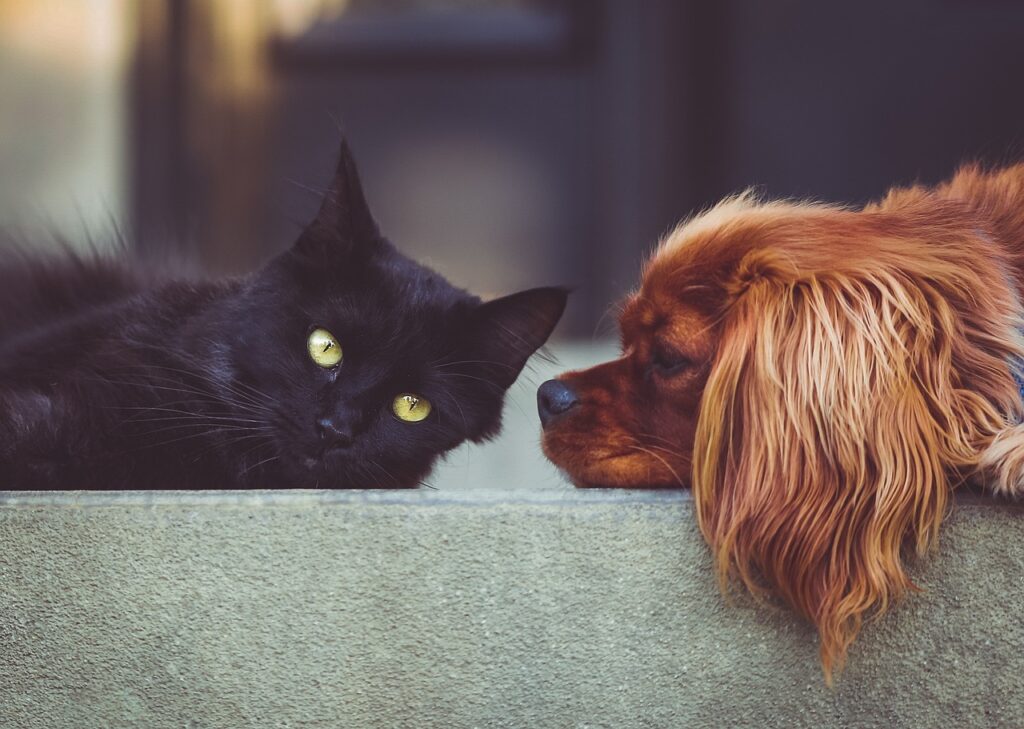let’s discuss how to stop dog aggression towards cats.
Stopping dog aggression towards cats requires a combination of training, management, and positive reinforcement. Here are some steps how to stop dog aggression towards cats?

Positive Reinforcement: –
Stopping dog aggression towards cats requires a consistent, positive approach. The key is to use positive reinforcement training to reshape your dog’s behavior and build a healthy relationship between your canine and feline companions.
Positive reinforcement is a highly effective method for modifying aggressive tendencies in dogs. By rewarding calm, friendly behavior around cats, you can gradually condition your dog to associate cats with good things, like treats and praise. This builds trust and reduces the likelihood of future conflicts.
Create Safe Spaces: –
Dogs and cats may not always see eye-to-eye, but with the right approach, you can help curb aggressive behavior and foster a peaceful coexistence. The key is to create safe, structured environments that allow your pets to gradually get comfortable with one another.
Begin by setting up separate zones in your home where each animal can retreat and feel secure. Provide your dog with its own bed, toys, and feeding area, while doing the same for your cat. Slowly introduce the pets, always supervising closely and rewarding calm, gentle interactions. With patience and positive reinforcement, you can teach your dog to view the cat as a friend, not a foe.
Manage Triggers: –
Addressing dog aggression towards cats requires a multi-faceted approach. One of the key strategies is to identify and manage the triggers that lead to these undesirable behaviors. By understanding what sparks your dog’s aggressive response, you can take proactive steps to prevent escalation and create a harmonious environment for both pets.
Carefully observe your dog’s interactions with cats and take note of the specific situations that seem to trigger the aggressive behavior. This could be when the cat enters your dog’s territory, when the cat moves too quickly, or when the two pets get too close to each other.
Seek Professional Help: –
If your dog is displaying aggressive behavior towards your cat, it’s crucial to take immediate action. Ignoring the issue can lead to serious consequences, including potential injury to your pets. The best approach is to seek the guidance of a professional animal behaviorist or trainer who can help you address the underlying causes of the aggression and develop an effective training plan.
A qualified expert will be able to assess the specific dynamics between your dog and cat, identify the triggers for the aggressive behavior, and provide tailored strategies to modify your pet’s responses. They may recommend techniques such as desensitization, counterconditioning, or management solutions to help your animals coexist peacefully.
why do dogs attack cats for no reasons?

For a variety of causes, including innate tendencies, traumatic memories, or a lack of socialization, dogs may attack cats. Predatory instinct is a major factor, as dogs are naturally predatory and may perceive cats and other smaller animals as prey. Breeds with a history of hunting or strong prey drive may be more inclined to exhibit this tendency.
Dogs may also act aggressively toward cats on their territory, particularly if they believe that cats are intruders. Anger toward cats might also result from inadequate socializing during a crucial developmental stage. Additionally, unpleasant memories from the past, such being chased or scratched by a cat, might make dogs fearful or aggressive while defending themselves.
will my cat attack dog?

Whether your cat will attack a dog depends on various factors such as the individual temperament of your cat, the personality of the dog, their past experiences, and the current circumstances. Some cats may exhibit aggressive behavior towards dogs if they feel threatened, cornered, or provoked. Others may be more tolerant or indifferent, especially if they have been socialized with dogs from a young age.
Cats are generally territorial animals and may become defensive if they feel their space is being invaded by a dog. Similarly, if a dog behaves aggressively towards the cat or displays predatory behavior, the cat may respond with defensive aggression.
It’s essential to supervise interactions between your cat and dog closely, especially during the initial introduction phase. Provide both pets with their own safe spaces where they can retreat if they feel uncomfortable. Additionally, gradual introductions, positive reinforcement, and proper training can help foster a harmonious relationship between your cat and dog.
Ultimately, predicting whether your cat will attack a dog is challenging, but by understanding their behaviors and needs, you can take steps to minimize the likelihood of conflicts and ensure a peaceful coexistence between your pets.
conclusion
- In conclusion we have discussed how to stop dog aggression towards cats? stopping dog aggression towards cats requires a multifaceted approach that combines training, management, and positive reinforcement. By providing proper socialization, supervision, and consistent training, you can help your dog learn to coexist peacefully with cats. Positive reinforcement techniques, such as rewarding calm behavior and redirecting aggression, are essential for modifying your dog’s behavior effectively.
